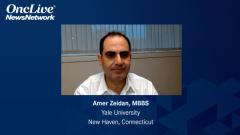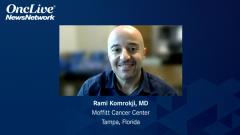
Data on Emerging Therapies for Treatment of Higher-Risk MDS
Experts in hematology take a detailed look at new data on investigational therapies for higher-risk MDS, including the STIMULUS-MDS1 trial on sabatolimab.
Episodes in this series

Transcript:
Amer Zeidan, MBBS: A number of abstracts were interesting for patients with high-risk MDS [myelodysplastic syndrome], but we didn’t see many clinical studies at ASH [American Society of Hematology Annual Meeting]. Some of that could be related to the pandemic and the impact of COVID-19. The only randomized study in high-risk MDS looked at sabatolimab, which is an anti-TIM3 immune checkpoint drug that had shown good data in a phase 1 study in combination with azacitidine. TIM3 is expressed in not only immune cells in the T cells but also some of the innate immune cells, such as NK [natural killer] cells and leukemia stem cells. It could have an impact directly on the leukemia stem cells.
Presented at ASH was a primary analysis of the STIMULUS-MDS1 study, which was a phase 2 study that randomized patients who receive an HMA [hypomethylating agent] with placebo or an HMA with sabatolimab. This study enrolled 127 patients, and it was a global study across 17 countries. The primary end point of this study looked at complete remission rate plus progression-free survival, so it’s a co-primary end point. The primary end point was not met, so there was no improvement with the combination over HMA monotherapy for the complete response [CR] rate or the progression-free survival. There was longer duration of response, especially for CR for those who achieved the responses on the combination therapy. There seems to be a late separation of the progression-free survival with longer follow-up. This seems to be more prominent in patients who have lower disease burden, less than 10% plasma [cells] or lower molecular IPSS [International Prognostic Scoring System]. There’s another phase 3 study of the same combination that has fully accrued and we are waiting for the results. That’s going to deliver the final conclusion regarding whether sabatolimab will have any role in the management of MDS.
We’ve already seen 2 drugs in this space, APR-246 and pevonedistat. Both were negative phase 3 trials, and that has been disappointing for us. In addition to sabatolimab, we have 2 other drugs being studied in the phase 3 setting. I don’t believe any data were presented at ASH for venetoclax and magrolimab. There’s a sixth drug, darbepoetin, a RAR-alpha agonist, which is also in a phase 3 trial. We’re still hopeful that we’re going to have additional drugs in the near future that can be combined with hypomethylating agents, which continue to be the standard of care in this patient population.
Lastly, there was a study in the relapsed/refractory setting using a CXCR1/2 inhibitor presented by Dr [David] Sallman. You’re the senior author on it, and it looks at the drug SX-682. It’s a small, phase 1 study, but it did show that some patients achieved marrow CRs after HMA failure, which is a very difficult setting to treat. One or 2 patients had improvement in the blood counts through transfusion, or hematologic improvement. There could be a signal there, but clearly we need more patients. Aside from this, there were limited MDS data, but I’m interested in your perspective on patients with high-risk MDS.
Rami Komrokji, MD: Absolutely. You presented the data on STIMULUS-MDS1. It was disappointing not to see improvement. We’ll wait for the final verdict with the phase 3 randomization. We hope that magrolimab and venetoclax will finish phase 3 trials and that 1 of them will be positive. Outcomes after HMA failure are poor, and that’s an unmet need where we need treatment.
Transcript edited for clarity.







































